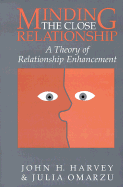Book contents
- Frontmatter
- Contents
- Preface and Acknowledgments
- 1 Introduction to the Minding Concept
- 2 Minding: Definition and Components
- 3 Knowing and Being Known by One's Partner
- 4 Attributions in Close Relationships
- 5 Acceptance, Respect, Reciprocity, and Continuity
- 6 Beginnings and Endings
- 7 Minding in the Close Relationship Literature
- 8 Minding and Other Major Concepts of Closeness
- 9 Evidence about Minding in Close Relationships
- 10 An International Perspective on Minding
- 11 Minding in Couples Therapy and Counseling
- 12 Limitations and Future Directions
- References
- Index
6 - Beginnings and Endings
Published online by Cambridge University Press: 14 September 2009
- Frontmatter
- Contents
- Preface and Acknowledgments
- 1 Introduction to the Minding Concept
- 2 Minding: Definition and Components
- 3 Knowing and Being Known by One's Partner
- 4 Attributions in Close Relationships
- 5 Acceptance, Respect, Reciprocity, and Continuity
- 6 Beginnings and Endings
- 7 Minding in the Close Relationship Literature
- 8 Minding and Other Major Concepts of Closeness
- 9 Evidence about Minding in Close Relationships
- 10 An International Perspective on Minding
- 11 Minding in Couples Therapy and Counseling
- 12 Limitations and Future Directions
- References
- Index
Summary
I love you. I've loved you since the first moment I saw you. I guess maybe I even loved you even before I saw you.
Montgomery Clift to Elizabeth Taylor in the movie A Place in the SunTo live in hearts we left behind is not to die.
AnonymousARE LOVE AND ROMANCE ENOUGH?
Aaron Beck argues, in Love Is Never Enough (1988), that many elements are necessary for long-term happiness in a relationship, in addition to love. This chapter echoes that message and applies it to the processes of beginning and ending relationships. It is too bad that love is not always as mystical and fated as is suggested by Montgomery Clift's character in A Place in the Sun. But most of the time, lasting love and closeness emerge only over time and a process of mutual activity by the partners. The process of getting to know another human for potential closeness embodies many small representations of the minding process that we believe operates most completely and effectively in long-term, committed relationships.
The anonymous quote that opens this chapter suggests the importance of the abiding mental presence of past lovers in our lives. Over the course of a “relationship career,” as it has been called in family sociology, people usually make a number of starts and endings at romantic close relationships. Some of these involve marriage; many do not. But all leave some impression on us that carries over into our beliefs and expectations about future relationships.
- Type
- Chapter
- Information
- Minding the Close RelationshipA Theory of Relationship Enhancement, pp. 97 - 119Publisher: Cambridge University PressPrint publication year: 1999



